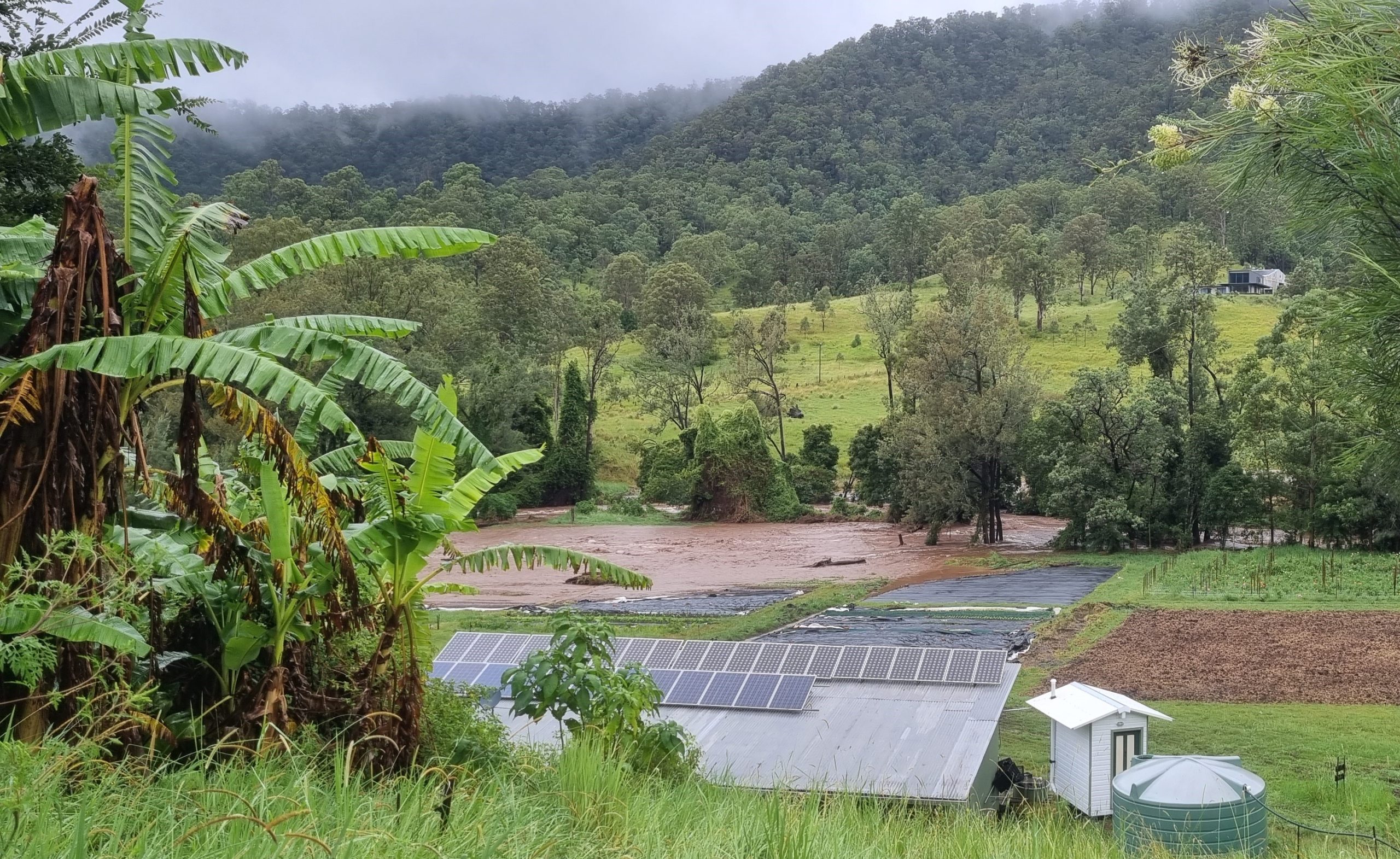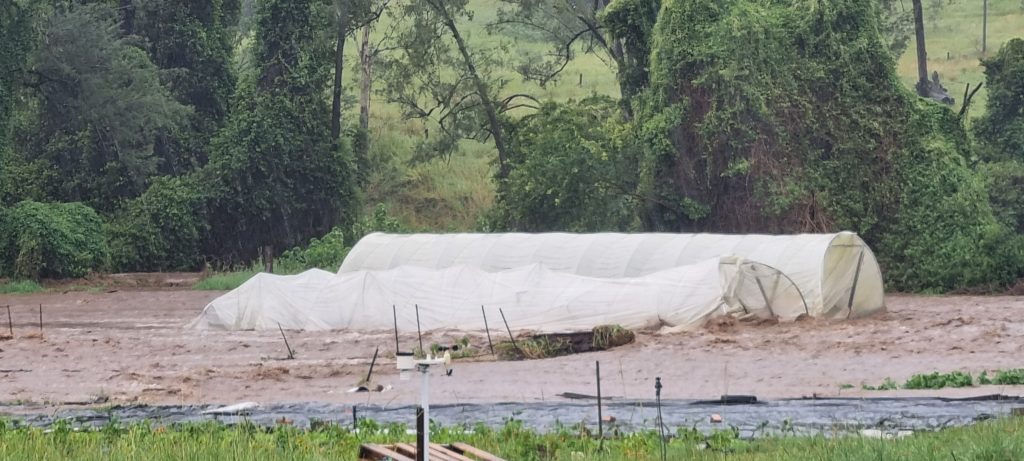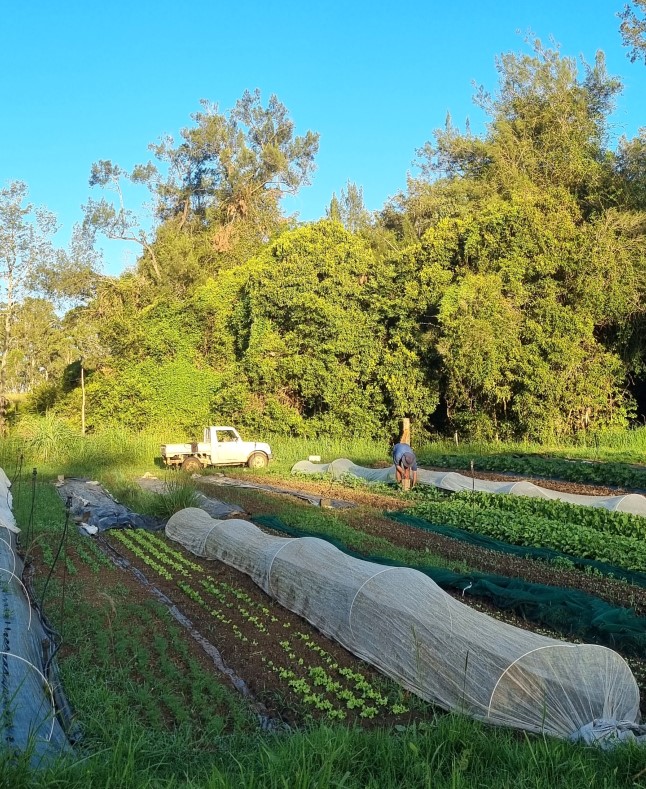
The ex-cyclone had us all hunkered down in our houses for long days and nights in March. Many of us were ‘inconvenienced’ for days on end – losing power, internet connection, frozen food, and possibly experiencing some damage around the garden. But pause for a moment to consider its effect on the people who grow the food we eat, and those who care for our local environment. Christobel Munson checked out how the storm impacted some local farmers and environmentalists. The Bangalow Farmers Markets manager, Kylie McGregor, pointed out that four or five regular stallholders have been unable to sell their produce since the storms, their farms having been devastated.
“While we are happy to see the back of Cyclone Alfred, his effects are still being felt by our community and farmers. Our hearts go out to those hit hard, including some of our farmers who have had crops wiped out and valuable topsoil washed away.

“Stock supplies might be down on some stalls (and overflowing on others), or some produce might look a little bruised and battered under the conditions. However, our stalls will never be empty like the supermarkets and will be replenished with locally grown and made food every week. Now more than ever is the time to get behind our farmers and support those who do have produce to sell.
“Our food and drink stalls have also taken a loss with markets being cancelled. So, if you don’t ordinarily stop for breakfast at the market, please take the time to grab a bite to eat and drink.
“We are incredibly grateful for your support throughout the year, but particularly in times like this. And it’s what sets our farmers’ markets and community apart—as well as providing a reliable food source, the markets are also a hub for our community (both stallholders and patrons) to come together, to regroup and to be thankful for what we do have.”
Julia Bolam and Taylor Jamieson have an organic farm outside Kyogle called Roseberry Growers. Taylor grows vegetables, and Julia sells her flowers at the Bangalow Farmers Markets.
“Alfred was pretty bad for our little organic farm,” Julia said. “My husband and I grow vegetables and flowers. We grow next to a creek which is in the Upper Richmond catchment and the Thursday/Friday rain blanketed the catchment for our creek. It isn’t a big creek, and it was just too much for it to handle.
“The creek broke the banks and caused a flash flood/flash river to travel through about 60% of our market garden – but it was the 60% that we had most of our crops in. The water was super powerful. It crushed two caterpillar tunnels. It also took a lot of topsoil and all the crops that were in that area.

“The topsoil loss is the worst part, as we had been working on the soil for years and it had started growing some really amazing vegetables. “This means we basically have to start again crop wise, so we will likely miss five to seven weeks’ worth of farmers markets, but then we will be back, initially with fast growing crops only. It is a real bummer, but we are just looking forward to getting back on track now.”
From farmers to those restoring our Big Scrub rainforest, Mark Dunphy, President of the Big Scrub Rainforest Conservancy, added: “After Cyclone Alfred, we noticed that individual trees are far more likely to have fallen, while not much damage was observed to trees within a forest structure. A high number of the trees that went down were eucalypts or exotics such as jacarandas and poincianas.
It highlights the value of promoting appropriate riparian and habitat restoration work that restores the original ecological communities of the site – for the Big Scrub footprint, planting rainforest species to areas that were previously rainforest will ensure more resilience to the weather extremes these plant communities have evolved to withstand.”
Along Byron Creek, Noelene Plummer of Bangalow Land and Rivercare observed: “We have had a look at most of our plantings and they appear to have escaped any major losses. There have been trees and branches down and some sites, like the All Souls’ creek walk, are muddy under foot.”
But the team was happy to take part in a planting session at Twin Creeks community in Fowlers Lane in the weeks following.